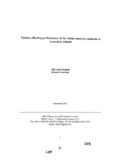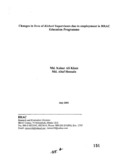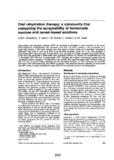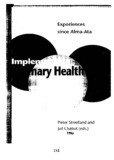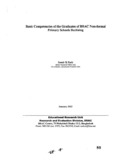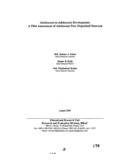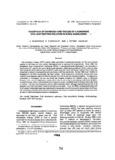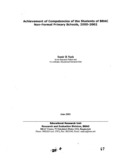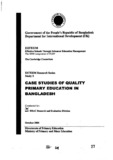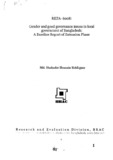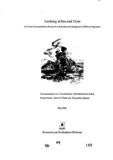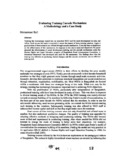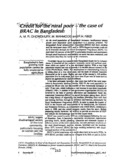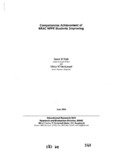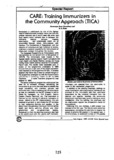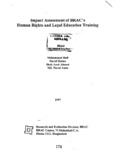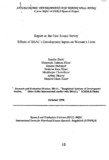BRAC Research and Evaluation Division (RED) Archive: Recent submissions
Now showing items 181-200 of 601
-
Factors affecting performance of the ethnic minority students in secondary schools
(BRAC Research and Evaluation Division (RED), 2003-12)BRAC started working with secondary education through its post primary basic education program since 2001. After piloting in 20 schools BRAC is now operating this program in 250 schools of which 175 have different ... -
Changes in lives of Kishori Supervisors due to employment in BRAC Education Programme
(BRAC Research and Evaluation Division (RED), 2003-07)This study aimed at exploring changes that occurred in the lives of Kisohri supervisors (KS) due to employment in the BRAC Education Programme CBEP). Twenty-six KSs, 24 non-KSs, 36 of their guardians, 67 community people ... -
Oral rehydration therapy : a community trial comparing the acceptability of homemade sucrose and cereal-based solutions
(Bulletin of the World Health Organization, 1991)Sugar-based oral rehydration therapy (ORT) for diarrhoea is promoted in many countries of the world. One programme in Bangladesh has instructed more than 13 million mothers in the preparation of a sugar-salt solution in ... -
Evaluating community ORT programmes: indicators for use and safety
(© 1986 Oxford University Press, 1986)Community-based oral rehydration programmes to reduce diarrhoea-related mortality have been initiated in many developing countries in recent years. However, to date few evaluation studies have been carried out on these ... -
Folk terminology for Diarrhea in rural Bangladesh
(Oxford University Press, 1991-03-01)Diarrhea, a descriptive term used in medical science for a variety of clinical diseases denotes an illness that is categorized differently and known by numerous terms in various cultures. These diversified classifications ... -
Empowerment through health education: the approach of an NGO in Bangladesh
(CIP-Gegevens Koninklijke Bibliotheek, 1990)The paper describes a health programme in Bangladesh which is distinct in many respects. Instead of providing curative services, the programme is educational; it works with the community in raising awareness, empowers ... -
Basic competencies of the graduates of BRAC non-formal primary schools declining
(BRAC Research and Evaluation Division (RED), 2003-01)Based on the Declaration of the World Conference on Education for All held in Jomtien in 1990, BRAC designed an instrument to measure the level of basic education of Bangladeshi children. The Research and Evaluation ... -
Adolescent-to-adolescent development a pilot assessment of adolescent peer organised network
(BRAC Research and Evaluation Division (RED), 2003-08)This is an early assessment of BRAC's Adolescent Peer Organised Network (APON) programme - an initiative towards adolescent-to-adolescent development in order to acquire and share knowledge through peer organised network. ... -
Perception of Diarrhoea and the use of a homemade oral rehydration solution in rural Bangladesh
(International Centre for Diarrhoeal Disease Research, Bangladesh, 1988)Oral rehydration therapy (ORT) is being widely promoted in developing countries but the socio-cultural aspects of diarrhea are often poorly investigated prior to planning the programs. Since 1980 the Bangladesh Rural ... -
Achievement of competencies of the students of BRAC non-formal primary schools, 2000-2002
(BRAC Research and Evaluation Division (RED), 2003-06)Using the test instrument developed for Education Watch 2000, this study assessed the achievement of competencies of the students of BRAC non-formal primary schools. Three batches of students (second, third and fourth) ... -
Case studies of quality primary education in Bangladesh
(BRAC Research and Evaluation Division (RED), 2004-10)How do some primary schools in Bangladesh succeed despite of well documented constrains they face? The major primary education research programmes conducted in Bangladesh over recent years have consistently demonstrated ... -
RETA- 6oo8: gender and good governance issues in local government of Bangladesh: a baseline report of extension phase
(BRAC Research and Evaluation Division (RED), 2004) -
Looking at ins and outs: a process documentation research on education for indigenous children programme
(BRAC Research and Evaluation Division (RED), 2004-05)Looking at Ins and Outs is a process documentation study on BRAC's Education for Indigenous Children (EIC) programme. BRAC's EIC programme was designed with a view to ensuring the general provision of education for ... -
Evaluating training cascade mechanism: a methodology and a case study
(BRAC Research and Evaluation Division (RED), 2004)Training has increasingly turned into an important NGO tool for rural development in Asia and Africa. Such an use has made it essential to assess the impact of these training sessions. Again a good portion of these ... -
Credit for the poor: the case of BRAC in Bangladesh
(BRAC, 1991)As the rural population of Bangladesh increases, landlessness among people once dependent upon agriculture is a growing problem. The Bangladesh Rural Advancement Committee (BRAC) has been working with the rural poor since ... -
Competencies achievement of BRAC NFPE students improving
(BRAC Research and Evaluation Division (RED), 2004-06)Competency achievement of the students of BRAC non- fonnal primary schools at the end of their primary cycle was assessed and reported in this article. Four cohorts of students were considered and brought under assessment ... -
CARE: Training immunisers in the community approach (TICA)
(BRAC, 1989) -
Impact assessment of BRAC's human rights and legal education training
(BRAC Research and Evaluation Division (RED), 1997)The huge training investment of BRAC calls for an answers to the questions -- what is the impact of the training on BRAC programs and on its recipient? This study endeavors to answer these questions. As a part of this ... -
Effects of BRAC's development inputs on women's lives
(BRAC Research and Evaluation Division (RED), 1996-10)The BRAC-ICDDR,B Joint Research Project consists of two phases of research, analysis and interpretation over a 6-year project cycle. Initiated in 1992, research in Phase I (1992- 1995) involved a large cross-sectional ...

